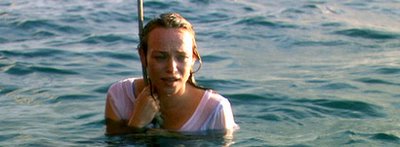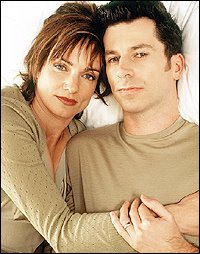Craven’s usual beat is the literature pages and it has been well-documented by Mark Davis in Gangland: Cultural Elites and the New Generationalism that unless you’re a member of the middle to late-aged Australian literati, or already nestled comfortably in your grave, very little of what anyone else writes in Australia passes muster according to Craven’s exacting standards. In his approach to reviewing television, Craven takes a similar nostalgic turn, citing the ‘1995 docu-drama* Blue Murder’ as ‘towering TV’. His argument is not that Australian film-makers aren’t capable of producing television that startles, but that it happened in a kind of golden era that has long since passed. I remember watching Blue Murder and I agree with Craven on the calibre of that drama, Richard Roxburgh was scary as Roger Rogerson in a way that I can’t recall seeing him since. Before that, I also remember being impatient for each episode of Phoenix to screen on the ABC, and on the basis of that drama I actively sought out other productions from Simpson Le Mesurier such as Good Guys, Bad Guys with Marcus Graham and Allison Whyte, which Craven also cites as, if not extraordinary, then certainly ‘worth spitting at’. Again, I would probably agree with him on his assessment of that program.
Where Craven and I part ways is over his framing of the alleged paucity of Australian television drama as a ‘problem’. He talks about the ‘wasteland of Australian TV drama’, citing MDA and Love My Way and asks ‘How much mediocrity is a nation of 20 million supposed to sustain?’ He contrasts Australian TV drama to the ‘white hot ...viability’ of North American productions such as Law & Order and Desperate Housewives. I think the comparison between the products of the USA and Australia is unfair, and since Craven brought up the question of population, I’ll begin with that. If the entire population of Australia is equivalent to just one major metropolitan centre in North America, then it is obvious that the playing field is not level. The advertising revenue that can be generated from across North America and thus fund the development of television drama is exponential to that available to Australian television producers. I would be interested to know, on a per capita basis, the number of television dramas that reach at least the pilot stage of production in each country. Further, I would be interested to know what percent of those pilots, in each country, are then continued into production. After that I would like the figures on which programmes rate sufficiently, either critically or commercially, to be deemed successful. The USA produces a lot of excellent television, there is no denying that, and if it seems to produce it more consistently than Australian producers and networks, then I think a review of the statistics would put Craven’s complaint into perspective. We know that Desperate Housewives was rejected at least three times—once by HBO, no less—before the executives at the American Broadcasting Company agreed to fund its production; we know that not every single one of the Law & Order franchises that went into production has been ‘successful’; and, in Australia, we certainly know that America produces a lot of execrable television drama since we are subjected to a deluge of it every summer by networks who tell us that every programme was ‘a US smash hit’ watched there by over 20 million people.
Craven warms to ‘what we can achieve in comedy, such as Kath and Kim’. I love Kath and Kim, and I think We Can Be Heroes deserves at least a mention by Craven—Chris Lilley’s Australian of the Year hopefuls were sublime, as was his supporting cast. Then Craven remembers The Games by John Clarke, and again, I agree with his esteem for its ‘sheer expertness ... [and] adherence to a vision’.
Craven and I part ways for the second time when he seeks solutions as to how the success in comedy ‘might be transferred’ to drama. He cites Clarke as an ‘admirer of the early ‘60s BBC policy of commissioning one-off TV plays from which a series might originate rather than indulging in a set of expensive pilots that just pave the road to perdition with dead turkeys’. I appreciate Craven’s turn of phrase, but I’m suspicious of his advocacy of a policy not only from another era, but a different institutional setting. The early BBC was funded by revenue raised from television licences, it didn’t rely upon ongoing advertising revenue, which is surely the ghastly bottom line for securing support from Australian commercial television networks for the creation of drama series and serials. Perhaps Craven’s suggestion would be a suitable policy for the ABC to adopt, if only the present government would fund it, instead of punishing the whole corporation for some apparently unfavourable news reporting by just one department. The commissioning editor of SBS Independent might have had something like BBC practices in mind when she commissioned RAN: Remote Area Nurse, currently screening at 8.30 on Thursday evenings (although the final episode is on 9 Feb.). To answer the question with which Craven began his column, I have been startled, to say nothing of gob-smacked, every time I have watched this Australian produced drama over the past 5 weeks. There is certainly the demand from those who have left comments on the programme’s website to produce more episodes, perhaps another season, of this short series.

RAN: Remote Area Nurse didn’t warrant a glance in Craven’s column on Australian television drama. It may well be due to a time lag between Craven’s writing and the paper’s publication of the article, but that’s no excuse not to include the earlier seasons of The Secret Life of Us and the poorly-treated-by-Ten-but-more-than-deeply-satisfying Crash/Burn. Does an explanation for the omission of these dramas lie in Craven’s seemingly blinkered approach to contemporary television writers and producers? It would seem so if his call to adapt his favourite novelists and playwrights’ work to the small screen is any indication. He writes that the skills honed in other mediums are ‘some of the time... transferable’, suggesting, I would argue, that those who devote themselves to television are not quite up to producing ‘decent’ and ‘good’ Australian television drama. I’m still not convinced that Australian television drama even has a problem as Craven constructs it, but if there is such a problem then it most certainly isn’t assisted by the pronouncements of commentators who demonstrate little knowledge or appreciation for what is unique about the medium in its present form and only serve to perpetuate insidious and self-fulfilling myths about the deficiency of Australian television production.

If Craven wants Australians to produce home-grown versions of Desperate Housewives and Lost he must begin by acknowledging that the sources of inspiration for both of these programmes are television itself; Housewives is a dramatisation of a quandary raised in an episode of Oprah, and what is Lost if not a carefully scripted series of Survivor? In my opinion, having a literature critic and reviewer write on television is akin to letting an accountant make television programming decisions.
*Craven’s identification of the genre as docu-drama is incorrect as that term is widely understood. Blue Murder was a crime drama based on actual events, it employed actors to perform a written script and was shot utilising documentary conventions, especially hand-held camera. Docu-drama/soap is more descriptive of programs like Sylvania Waters, or for more contemporary examples, think of The Osbournes and Newly Weds, where the content is apparently factual, but structured and edited according to dramatic narrative conventions
2 comments:
Interesting points, particularly as i come up from air after some serious telly bingeing (Deadwood, Lost and Dead Like Me).
I'm not a fan of Kath and Kim - I have real issues with the class stuff. Similar issues I had with The Castle.
But I was a Johnny-come-lately fan of Wild Side which I had begun to love just as it was axed, and I think it was under-appreciated.
How could we not have mentioned GP yet? Does Aussie drama get any better?
And what about Australian Story (which always facinates me - hardcore nationalism packaged as a sort of mini docu-drama thingy)? But let's not talk about current affairs or documentary or news (or should we? I mean, there's some really excellent stuff in these categories - Compass, Global Village, 7.30 Report etc etc etc).
I hesitate before mentioning those cooking shows that are getting about (what were we saying about class...?), but are we not counting life style programing?
I guess there's a point to be made about 'reality telly' and how it might have contributed to a drought in the Aussie TV universe (to mix a metaphor) - or is that kind of a given? Though I'm reluctant (as you are) to accept a sort of blanket 'Aussie telly's crap' verdict.
I also want to think about recent public commentaries about Australian film and how there's also (apparently) a dearth of good Aussie Film action. A point I simply don't agree with - 2005 was a surprisingly good year for Australian film. Considering it was meant to be a dearthy sort of year.
And I keep thinking about the relationship between the Australian film and television industries... and then I want to talk about govt funding for film projects v govt funding for the ABC (and SBS) - home of goodies like GP...
And then I want to talk about how excellent 'foreign' television like Six Feet Under and Deadwood and so on might influence Australian television in the future (somewhere inside me there's a comment about Buffy opening up the whole self-reflexive 'edgy' genre, but I'm trying to quash it).
but this isn't my blog so I can't.
But I'm definitely interested. Keep thinking and writing about this, will you?
I loved Good Guys, Bad Guys too, btw. Loved it.
You may be sorry you ever encouraged me to keep writing about this topic in this forum; television drama is a major area of exploration in my thesis, so I'm sure I'll bore you all for the next three years.
Since Peter Craven's column addressed itself to the genre of drama, I only thought about the claims he made about the apparent decline in drama or fictional television. I was reading a bit more today about what is seen to constitute 'quality' television drama and Craven's call for a return to the BBC practice of one-off plays and adapting literary texts is a call for 'quality' in the British sense. His call for authored television texts that go against the 'mass' aspect of television writing and production ie industrialisation and professionalism is more of the same. It could be summarised that he is calling for an end to the messy flow and segmentation of television and demanding the solid ground of an intervention/penetration into that flow from the 'quality' product.
Yes, apparently this is the kind of gendered binary that is applied in discussion of 'quality' v not-quality television all the time. But more on that another time.
It is worth noting that discussions about the paucity of Australian television focus entirely on drama or comedy. There is the argument that 'reality' or 'reality game shows'and other non-fiction programmes have lead to more Australian content on television and it's interesting that 'quality' is never used to describe them--I'm not just talking Big Brother or Australian Idol here--The Colony which screened on SBS last year was worth a look and I'm sure there are plenty of others, including the news programmes you mention. I think we can say that Australian television is doing quite alright across a range of genres. (And praise be SBS!And GP was excellent. I was also addicted to Water Rats.)
Post a Comment